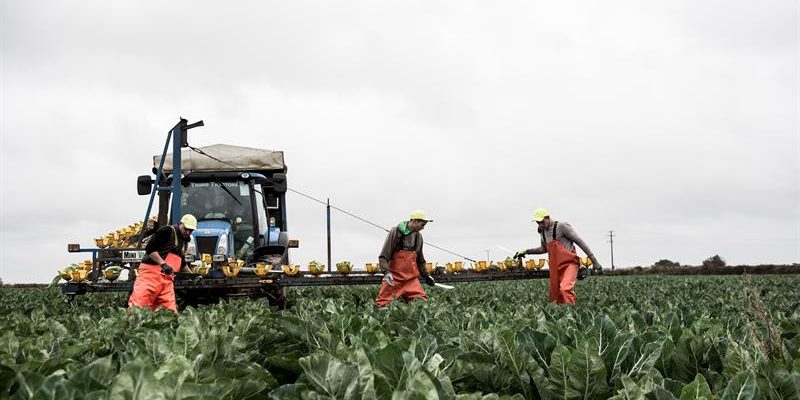The UK food and drink sector is calling for a ’12-month Covid-19 Recovery Visa’ to help alleviate the workforce shortages that are causing serious disruption across the whole of the supply chain.
The report has been sent to government ministers highlighting the impact the pandemic and the UK’s post-Brexit immigration policy is having on the sector’s ability to recruit key workers. The report highlights an average vacancy rate of 13% and estimates there are more than 500,000 vacancies across food and drink businesses.
In order to ensure continuity, quality and choice in our food supply both in the immediate and medium-term, the report sets out clear ways government can help the food and drink industry overcome the current workforce challenges.
NFU Vice President Tom Bradshaw said: “At the very start of the supply chain, farm businesses are feeling the pressure. For example, horticulture farms are struggling to find the workforce to pick and pack the nation’s fruit and veg, with some labour providers seeing a 34% shortfall in recruitment.
“Farm businesses have done all they can to recruit staff domestically, but even increasingly competitive wages have had little impact because the labour pool is so limited – instead only adding to growing production costs.
“It is simplistic to argue that the end of furlough will see many more people meeting this shortfall, but furloughed workers are concentrated in urban areas and not where many agri-food roles are located. A solution to this crisis will need the right people with the right skills and training available in rural areas where many roles are based.
“A short term Covid Recovery Visa, alongside a permanent Seasonal Workers Scheme, would be an effective and, frankly, vital route to help the pressing needs of the industry today. It would also give us time to invest in the skills and recruitment of our domestic workforce, helping to provide long-term stability so we can recruit the people we need to continue to deliver quality, nutritious and affordable food for the nation.”
The Food and Drink Federation’s Chief Executive, Ian Wright CBE, said: “This really authoritative report sets out in stark detail the labour and skills shortages currently facing the food supply chain. Drawing on a wide range of evidence the report illustrates the breadth and scale of the issues confronting the industry. The report makes it crystal clear that today’s labour shortages are caused by a multitude of structural factors beyond those created by Covid-19 and the end of the Brexit transition period.
“The recommendations set out within this report, including the Covid Recovery Visa and measures to support domestic training and skills development, the adoption of new technologies and career promotion, provide industry and the Government with highly practical solutions.
“They will ensure that the food supply chain continues to thrive with a strong and skilled workforce. However, it is also evident that without fast action the labour challenges will continue. If they do, we can expect unwelcome consequences such as reduced choice and availability for consumers, increased prices, and reduced growth across the domestic food chain.”
Nick Allen, Chief Executive of the British Meat Processors Association, said: “The meat industry has been severely impacted by the current labour crisis, which is not only resulting in shortages in shops but is also beginning to have increasing upstream impacts on farms.
“We have welcomed the opportunity to join with other sectors in the food industry to pull together a summary of the massive challenges we are all facing and to offer some immediate and practical solutions to government.”
Dr Judith Bryans, Chief Executive of Dairy UK, sadi: “The food and drink sector is the bedrock of food security in the UK as well as being a major contributor to the economy.
“The food sector is investing into the skills and recruitment of its workforce and taking all the measures it can to address the many issues raised in this report. However, we are now experiencing significant difficulties in terms of labour shortages. One very practical example is the disruption in the delivery of food across the UK due to the serious shortage of HGV drivers.
“This report lays out clearly what Government support and interventions are now essential for the food and drink sector to address these issues and avoid a future of continued disruption. We’d strongly urge the Government to act upon the recommendations within this report.”
Richard Harrow, Chief Executive of the British Frozen Food Federation, said: “Labour shortages throughout the food supply chain are creating a ‘perfect storm’ of increasing costs for our members. Whilst the long-term solution is to train more UK nationals, we will only avoid further disruption to food supplies and inflationary cost increases by taking the temporary visa measures this report is recommending.”






